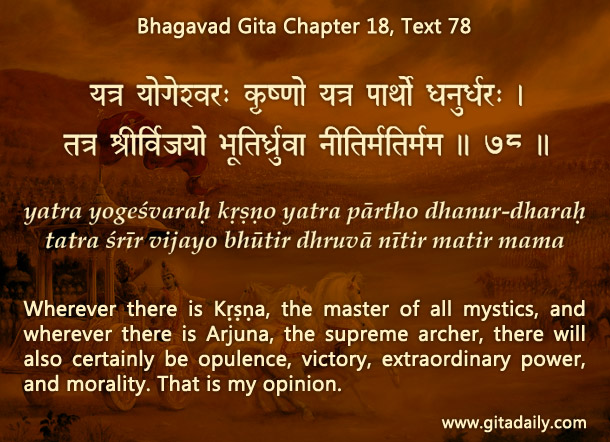The Bhagavad-gita starts with a vividly specific setting: an inquiry by the blind king Dhritarashtra about the events on the battlefield of Kurukshetra (01.01). He is worried whether his sons, the Kauravas, will win against their cousins, the Pandavas. Though the Kauravas are superior in number, the Pandavas are superior in virtue. And the Pandavas’ greatest virtue is their devotion, which has attracted the Supreme Lord, Krishna, to be on their side. Just when the war is to begin, the foremost Pandava archer, Arjuna, observes the assembled armies, contemplates the imminent fratricidal war and loses his will to fight, as signified by his putting aside his bow (01.46).
From this specific setting, the Gita rises to a wide-ranging discussion on universal themes such as identity, duty, destiny and divinity. The Gita’s penetrating insights on these themes have made it relevant for millions for millennia. Despite offering universal wisdom, the Gita doesn’t forget or neglect its specific context. Its verses can therefore be understood both in their specific and universal dimensions. Let’s consider how these two dimensions apply to the Gita’s last verse: where there is Krishna and Arjuna, there will be victory (18.78).
Specific implication: This prophecy is an indirect answer to Dhritrashtra’s starting question: victory would come to the Pandavas’ side, not his sons’ side.
Universal implication: This verse refers to Arjuna as the bow-carrier, which indicates that he has picked up his bow and is ready to fight. Just as the Gita empowered Arjuna to do a difficult duty, it can empower us to face our life’s challenges. And if we do our duty diligently, staying devotionally connected with Krishna in our heart, just as Arjuna and Krishna were together on the chariot, this verse’s prophecy suggests that we too will be ultimately successful.
One-sentence summary:
The Gita’s concluding verse answers its starting question and assures devotees of their ultimate triumph.
Think it over:
- What are the two dimensions in which the Gita’s verses can be understood?
- What is the specific implication of the Gita’s concluding verse?
- What is the universal implication of the Gita’s concluding verse?
***
18.78: Wherever there is Krishna, the master of all mystics, and wherever there is Arjuna, the supreme archer, there will also certainly be opulence, victory, extraordinary power, and morality. That is my opinion.
To know more about this verse, please click on the image


Leave A Comment